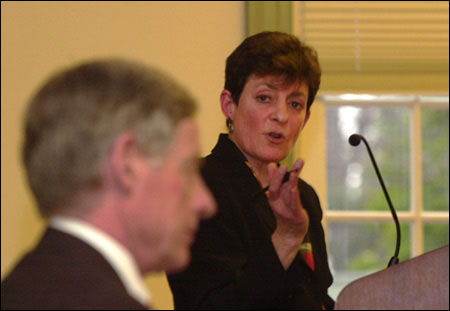‘Manliness,’ an obsolete concept? Discuss.

A few years back, an editor from Harvard Magazine called Harvey Mansfield and asked if he would contribute a short quote for a profile of a fellow faculty member. Mansfield replied that the quality that had always impressed him about this colleague was his manliness.
“There was a pause,” Mansfield said. “Then the voice on the other end said, ‘Can you think of another word?’”
Mansfield told the story to show that in the opinion of many, manliness is obsolete. Yet he prefers the word to its more up-to-date synonym, “masculinity,” so much so that he is currently writing a book on the concept and its relevance in today’s world.
Mansfield, the William R. Kenan Jr. Professor of Government, took part in a “conversation” April 3 on “Teaching About Manhood and Masculinity.” His interlocutor was Nancy Cott, the Jonathan Trumbull Professor of American History and director of Radcliffe’s Schlesinger Library. The Radcliffe Institute for Advanced Study sponsored the event.
One of Harvard’s most prominent conservatives, known for his opposition to affirmative action, multiculturalism, feminism, and grade inflation, Mansfield identified the characteristics of manliness as self-confidence, independence, and the ability to exercise authority.
While today’s “gender-neutral world” may claim to have little use for these virtues, the climate may be changing, due in part to 9/11 and the increasing importance of men in uniform. Yet, this development is not without its irony.
“It was men who destroyed the World Trade Center, and it was also men who rushed in to save people who were trapped. Perhaps women still need men to save them from men,” Mansfield said.
Mansfield also questioned whether women – even feminists – are really so opposed to manliness, “especially in its milder form of the gentleman. Women are still sensitive to small courtesies and award points for them, especially in the early stages of a relationship.”
Although Mansfield allowed that women could be manly, Margaret Thatcher being a case in point, he maintained that manliness was primarily characteristic of men and that recent research by social scientists showed that this was in fact the case.
“Research by psychologists demonstrates that sex differences are not stereotypes, but that they are more or less true.”
Cott, who taught a history course last term called “Men, Manhood, and Masculinity,” said that her responsibility as a historian compelled her to point out that manliness was indeed an obsolete word, as shown by the fact that the most recent citation in the Oxford English Dictionary is dated 1879.
Cott began by stating her point of view clearly.
“My teaching is from a feminist perspective. I believe that men and women are inherently valuable, and I embrace the desire to make that a reality.”
Gender matters, she said, because while, “humans exist as male and female, their differences are filtered through culture, so that notions of gender are not constant but inherently historical.”
Feminist scholars, said Cott, have provided the energy behind gender studies because – as a group that has been largely excluded from history – women are more motivated to explore the dynamics that have kept them out. History that centers on men as an identified group makes less sense because “the dominant rarely reflect on their dominance.”
If men did reflect on their position in society, their interpretation of what Mansfield identified as manly virtues might be very different.
“The independence of men is a relational term,” she said. “Men were independent because they had control of the resources and people were dependent on them. They had power in the household to command the labor of women and slaves.”
There has been some scholarly focus on men in recent years, she said, and what it has shown is that masculine norms have shifted over time. Thus, it would be more accurate to speak of masculinities rather than masculinity.
“This is hopeful because it implies that the more destructive features may be subject to change,” she said.
Mansfield took exception to seeing masculinity as a shifting phenomenon.
“Yes, manliness has a periodicity. But in order to have masculinities in the plural, there has to be an essence. You can’t have a history of a thing unless there is something unchanging.”
Cott questioned Mansfield’s insistence on using manliness as an ideal term.
“There must be a better term than manly. Nobility, character, courage, and integrity are wonderful principles for human behavior. Why not dispense with trying to save the word and hold up these other terms as ideals?”
But Mansfield could not accept this compromise.
“Principles are all very fine, but they need someone to stand up and vindicate them, to risk one’s life for them in extreme cases. Principles don’t establish themselves. They need someone to defend them.”




